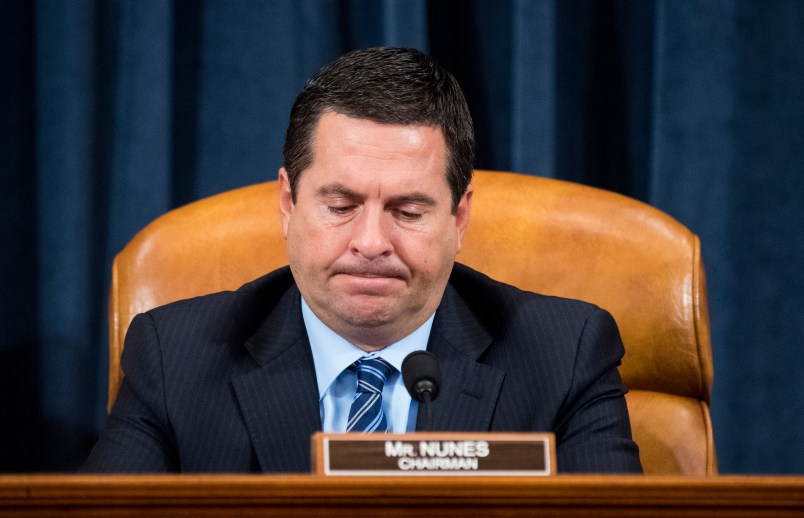Rep. Devin Nunes (R-CA) has done everything an uber-conservative is supposed to do to successfully sue his hometown newspaper and Twitter trolls: He filed multi-million dollar lawsuits, immediately alerted Fox News to the developments and then went on Sean Hannity to shout about his victimhood.
But he seems to have forgotten to do one thing — actually serve the defendants.
The congressman filed a $150 million lawsuit on April 8 against the Fresno Bee, its publisher McClatchy and Liz Mair, a Republican communications strategist, alleging the newspaper, in its reporting on a cocaine and sex worker scandal involving a California winery he’s invested in, went out of its way to tie him to the incident.
Representatives for McClatchy have called the lawsuit against the Fresno Bee “meritless,” and the publisher’s lawyer intends to file a motion to dismiss the case — if Nunes ever actually serves them and takes the case to trial. (Mair confirmed to TPM that she also has not yet been served by the lawmaker).
Nunes’ relationship with his hometown newspaper hasn’t always been so icy. When the young congressman was first elected in 2002, the Fresno Bee endorsed him during the Republican primaries, support that was crucial to him prevailing in the general election, McClatchy CEO Craig Forman told TPM.
“I don’t want to suggest it won the election for him, but it certainly helped him succeed in that part of the world,” Forman said.
The Fresno Bee endorsed Nunes in several subsequent reelection bids, until the congressman began snubbing the newsroom. It’s been more than a year since Nunes has communicated with the Bee’s newsroom.
The paper did not endorse him in the 2018 midterms, when Nunes defeated Democratic challenger Andrew Janz, but only out-raised him by $3 million. For the eight-term incumbent in a solidly Republican district, Janz’s challenge was the toughest in years.
And it’s for that reason, the lawsuits seem to hold some political value for Nunes.
According to the most recent Federal Election Commission’s filings, Nunes raised nearly $350,000 in the last two weeks of March, right after he filed his first lawsuit against Twitter, Mair and two troll accounts — his “cow” and his “mom” — for $250 million. Similar to his rollout of the suit against McClatchy and Mair for $150 million, Fox News was first to report on the lawsuit, and Nunes went to the network for an interview with Sean Hannity.
The Fresno Bee was first to note the uptick in fundraising during the 12-day span between when the first suit was filed (March 19) and the last day of the filing period (March 31). Of the $348,000 he raised in that timeframe, more than half of the donations came from donors outside the state of California. For context, Nunes has raised about $1.2 million total so far in 2019. It’s not yet clear how much he’s raised since the McClatchy suit was filed.
McClatchy lawyer Ted Boutrous told TPM the motive for the lawsuit against the publisher appears to be in part political and in part designed to intimidate the press.
“It really is just baffling,” he told TPM. “It’s really pretty transparent that they’re misusing the justice system as part of a political and PR ploy. And I don’t think the courts are going to take kindly to that. … I’ve had many cases where it was clear that a party filed a lawsuit to achieve other objectives, but this is so blatant, so inappropriate, so baseless. It may be one for the record books.”
Nunes lawyer, Steven S. Biss of Charlottesville — who had his license suspended for a year by the Virginia State Bar in 2009 for violating conflict of interest rules with a client — and a spokesperson for his congressional office did not immediately return TPM’s request for comment.
Regardless, McClatchy is mounting a “vigorous defense” of the Fresno Bee. Here’s a rundown of the publisher’s three-prong rebuttal:
1. Nunes is ‘exactly the kind of public official that the public needs to scrutinize’
As even Trump-BFF and Nunes ally Hannity pointed out in his interview with Nunes after the congressman filed his first lawsuit against Twitter trolls, the congressman is an elected official and a public figure. And there’s settled Supreme Court law on McClatchy’s side.
One of the most powerful First Amendment cases decided by the Supreme Court — Hustler v. Falwell — gives the public, and that includes publications, the right to scrutinize, criticize and mock public officials. In the Hustler case fundamentalist minister Jerry Falwell sued Hustler magazine for publishing a lewd cartoon of him. The court ruled unanimously that publications like Hustler have every right to criticize public figures, as long as it doesn’t make false statements with the intention of actual malice.
“(The court) held that this really nasty and mocking cartoon in Hustler magazine about Jerry Falwell was protected by the First Amendment because we have a grand tradition in this country of criticizing, mocking and ridiculing public figures,” Boutrous said.
“And that’s why the First Amendment protects the kind of speech involved in both of these cases,” he continued. “He’s a public official, he (was) the chairman of the House Intelligence Committee. He’s exactly the kind of public official that the public needs to scrutinize. … They don’t seem to realize that. They don’t seem to understand our Constitution.”
2. The entire story is based on court documents
The Fresno Bee’s cocaine yacht story was based on a lawsuit filed by one of the women who served wine aboard the yacht where the incident took place. It was also based on court records associated with her settlement agreement with the owner of the winery. Nunes’ investment in the winery is also a matter of public record.
“The facts in this specific complaint about the congressman’s investment in this winery are not in dispute,” Forman said. “And not only are they not in dispute, it’s a matter of settled law and all of it is public in California. … The facts have been correctly reported by the Fresno Bee.”
3. There’s no basis for filing the suit in Virginia
Nunes’ decision to file the suit against the California-based publisher in Virginia left Forman scratching his head.
“If you’re a congressman from that district, maybe it reflects the fact that the person you’re suing is a big employer or has a lot of pensioners and they’re constituents who may or may not get a chance to decide whether or not to vote for you again when you put yourself up for reelection,” Forman said. “Sure, we’re a company that operates around the world, but he’s obviously not suing us in North Korea.”
As the Columbia Journalism Review noted this week, California has some of the strongest Anti-SLAPP laws — which allow for quick dismissals of cases that involve speech on a matter of public concern — in the country. Virginia’s are weak by comparison. But Boutrous argues California law will likely be applied here.
“Just because they filed in Virginia doesn’t mean Virginia law is going to apply,” he said. “And of course the federal Constitution, the First Amendment, due process principles about personal jurisdictions, those apply in any court, so they’re not going to get away with this gamble.”












Can someone explain normal procedure here? Is it always on a plaintiff to both file a lawsuit and serve notice to defendants that they’re being sued? Does no court date etc get set until they’ve provided proof that the defendant was served and knows about the suit?
Nunes is hilarious when he plays the victim.
“Criminal Justice Process Isn’t A Political Weapon”
——Barr
If the defendant is not served, the case does not proceed.
The court date is set when the suit is filed. It does not wait for the plaintiff to serve the defendant. If, however, the court date arrives and the defendant has not been served, the case will not be heard by the court.
Yes it is. Plaintiff has to pay for issuance of a citation then pay to have it served by a process server .